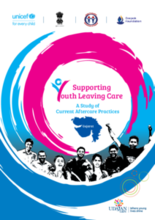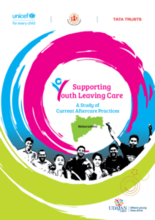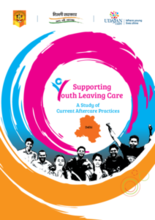Displaying 471 - 480 of 991
This study estimated the impact of state and individual-level risk and protective factors on adverse 19-year-old outcomes among a cohort of U.S. transition age youth.
This study tests whether an expansion of the Danish aftercare scheme in 2001 affects later outcomes of foster care alumni.
The present study uses the US National Youth in Transition Database (NYTD) to examine educational attainment, employment, homelessness, and incarceration for white, African-American, Hispanic, and American Indian/Alaska Native emancipated youth.
This chapter from Former Foster Youth in Postsecondary Education focuses on the transition point when youth begin to age out of care and may move into postsecondary education.
The aim of this study is to discover how the different factors documented at the time of the custody decision or the placement in out-of-home care are associated with the coping abilities of young adults once aftercare services come to an end.
This review aimed to identify, appraise and synthesise published literature concerned with the reunification of looked after children with their birth parents in the UK.
“Current Aftercare Practices” (CAP) is a documentation exercise designed to look at the support and services received by Care Leavers (CLs) from the objective lens of an ‘Aftercare Quality Index’ (AQI), calculated using the scores within 8 domains. This report covers a total of 104 CLs from Gujarat, comprising of 63 males and 41 females, from both Government and NGO-run Child Care Institutions (CCIs).
“Current Aftercare Practices” (CAP) is a research study designed to look at the support and services received by Care Leavers (CLs) from the objective lens of an ‘Aftercare Quality Index,’(AQI), calculated using the scores obtained on 8 domains. This report covers a total of 108 CLs from Karnataka, comprising of 47 males and 61 females, from both Government and NGO-run Child Care Institutions (CCIs).
“Current Aftercare Practices” (CAP) is a research study designed to look at the support and services received by Care Leavers (CLs) from the objective lens of an ‘Aftercare Quality Index’(AQI), calculated using the scores within 8 domains. This report covers a total of 107 CLs from Maharashtra, comprising of 74 males and 33 females, from both Government and Non-Governmental Organisation (NGO) run Child Care Institutions (CCIs).
“Current Aftercare Practices” (CAP) is a research study designed to look at the support and services received by Care Leavers (CLs) from the objective lens of an ‘Aftercare Quality Index’(AQI), calculated by using the scores within eight domains. This report covers a total of 55 CLs from Delhi, comprising of 30 males and 25 females, from both Government and NGO-run Child Care Institutions (CCIs). It also includes data from 10 stakeholders, which includes experts, practitioners and duty bearers, working in the field of child protection in Delhi.




